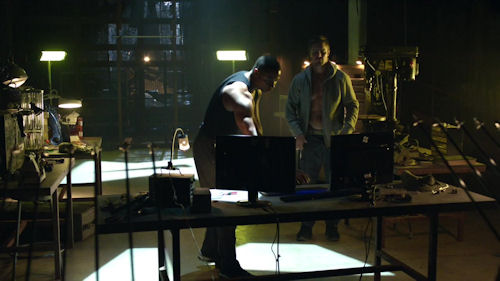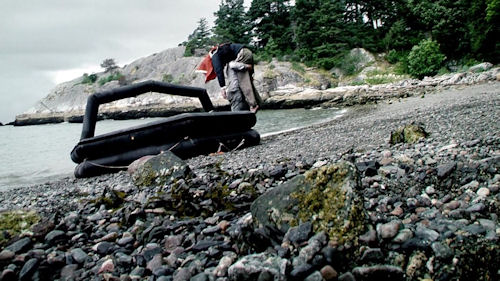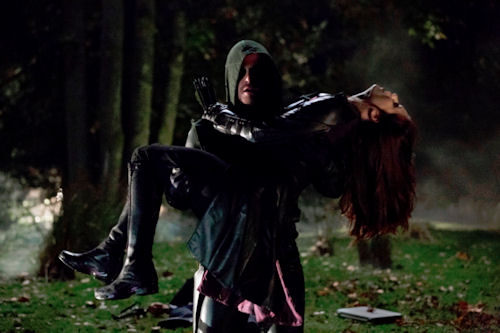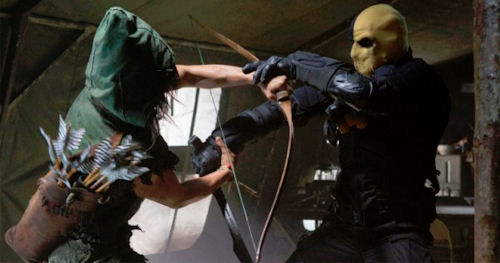Arrow came about to fill the void in the CW’s lineup left by Smallville. It wasn’t exactly rocket science. One show starring a DC Comics superhero replaced another. Arrow featured Oliver Queen, known better in the comic medium as Green Arrow. He was a fairly safe bet for the network, having already been popularized with the audience in the last few seasons of Smallville. Another bonus was that his lack of superpowers meant they could ease up on the special effects budget. This was a good deal and wouldn’t have required much effort to set it up as a decent successor to Smallville.
Thankfully, effort was put into it anyway, and the quality of Arrow’s first season surpassed that of any season of its red and blue predecessor.
Arrow proved to have a solid grasp of what kind of show it wants to be. It’s a relatively grounded superhero drama. Oh, and Batman. It really does want to be Batman. I can forgive this, though. So long as Batman remains a movie powerhouse, no one’s going to be allowed to produce a live action television series with him. Besides that, Green Arrow has a long history of borrowing Batman's characteristics, so this isn’t really an example of the CW trying to fit a square peg into a round hole. It also helps that the strongest qualities of Arrow so far are things unique to Green Arrow and really would not have been possible, to an extent, in a Batman series.
 The first season of Arrow told the story of Oliver Queen’s return after being stranded on a dangerous island for five years. But most importantly, the series gave him a cast of characters to augment his return and to make it worthwhile. See, in the comics Ollie returned from the island in a sort of vaccuum. Both of his parents were already dead. He was an only child. He had no major friends or love interests around. The makers of Arrow clearly recognized what a missed opportunity that was and corrected the error. Now he had a mother with secrets to hide, a little sister who's no longer so little, a stepfather instead of a father, an ex-girlfriend with serious unresolved issues. and a best friend he with whom he had little in common anymore. This wasn’t just good for television. It stands as one of the better alterations to the character in any medium.
The first season of Arrow told the story of Oliver Queen’s return after being stranded on a dangerous island for five years. But most importantly, the series gave him a cast of characters to augment his return and to make it worthwhile. See, in the comics Ollie returned from the island in a sort of vaccuum. Both of his parents were already dead. He was an only child. He had no major friends or love interests around. The makers of Arrow clearly recognized what a missed opportunity that was and corrected the error. Now he had a mother with secrets to hide, a little sister who's no longer so little, a stepfather instead of a father, an ex-girlfriend with serious unresolved issues. and a best friend he with whom he had little in common anymore. This wasn’t just good for television. It stands as one of the better alterations to the character in any medium.
But let's give credit where it’s due. The cast wouldn’t mean much if the actors involved weren’t up to the job. Susanna Thompson led the charge as Ollie’s mother, Moira Queen. The role required her to shift between being the protective matriarch to the fearful co-conspirator to the potential villain, and often required all of that in the span of a single episode. It was a complex role that Thompson handled well. Colin Donnell’s work as Ollie's best friend Tommy Merlyn was worth praise as well; most of us had him pegged as the enjoyable but very predictable Lex Luthor or Harry Osborn of the show. He killed that performance and ended the season by defying those predictions.
If there were weak links in the regular cast, they were Katie Cassidy’s Laurel Lance and Willa Holland’s Thea Queen. Neither was really the fault of the actresses, though. The material just wasn’t there for them like it was for other characters. Laurel spent the season as the love interest, rarely getting to branch out beyond that role. There was potential in her relationship with her father, but that thread never quite received the attention it needed. Meanwhile, Thea seemed to run out of gas midway through the season. Early on, her struggle with having her big brother back, but changed, was endearing, but it didn’t go anywhere. That plot thread largely faded away, and Thea’s character was left to linger until she was shoehorned into a chemistry-less relationship with Roy Harper toward the end of the season.
 Arrow made regular use of flashbacks to Ollie’s time on the island, and these often provided the most interesting moments in the episodes. It was like Lost, but you came away actually feeling satisfied. They also allowed Stephen Arnell to vary his performance. In the present day, Ollie’s pretty introverted most of the time, which didn’t give Arnell a lot to work with emotion-wise. The flashbacks allowed him to play a younger version of Ollie, and you could tell Arnell was paying attention to how the younger Ollie talked and moved. As the season went on, the island narrative did end up becoming too convoluted, especially with Eddie Fyers’ ridiculous terror plot. In hindsight, I think it would have been better if Shado was saved mostly for season 2 and season 1 focused more on Ollie’s partnership with Slade Wilson. Still, the excesses of the island story never became so bad that they derailed the story, and seeing how Ollie developed from the spoiled rich kid he was to the skilled hero he became will likely remain a compelling part of the show for seasons to come.
Arrow made regular use of flashbacks to Ollie’s time on the island, and these often provided the most interesting moments in the episodes. It was like Lost, but you came away actually feeling satisfied. They also allowed Stephen Arnell to vary his performance. In the present day, Ollie’s pretty introverted most of the time, which didn’t give Arnell a lot to work with emotion-wise. The flashbacks allowed him to play a younger version of Ollie, and you could tell Arnell was paying attention to how the younger Ollie talked and moved. As the season went on, the island narrative did end up becoming too convoluted, especially with Eddie Fyers’ ridiculous terror plot. In hindsight, I think it would have been better if Shado was saved mostly for season 2 and season 1 focused more on Ollie’s partnership with Slade Wilson. Still, the excesses of the island story never became so bad that they derailed the story, and seeing how Ollie developed from the spoiled rich kid he was to the skilled hero he became will likely remain a compelling part of the show for seasons to come.
While the recurring cast and flashbacks gave Arrow a strong backbone, the show was regularly let down by its more episodic content. It seemed like every week found Ollie going up against some less than remarkable villain. Even when iconic Green Arrow foes like Deadshot and Count Vertigo debuted, they were disappointments. The worst of the lot was the Huntress. Her premise sounded great on paper. She was a kindred spirit to Ollie but became the kind of monster he was always on the verge of becoming himself. Jessica De Gouw turned in a poor performance as Helena Bertinelli, but to be fair, the script didn’t help any. No one could have salvaged that scene where she and Ollie share a neck-snapping moment. And the debut of her in costume as the Huntress was pretty laughable since the costume was just so bland and uninspired. This is most definitely an area Arrow needs to improve upon in its second season.
 The saving grace of Arrow’s villains was John Barrowman as Malcolm Merlyn. At first, he seemed to be your typical rich guy villain, but that began to change drastically in the latter half of the season. He turned into something of an evil Bruce Wayne, with the traumatic death of his wife morphing him into someone hiding a dangerous alter ego. What elevated him beyond other villains was his genuine love for his son and how he was portrayed as Ollie’s superior. In fact, it’s you could argue about whether or not Ollie actually defeated him in the end.
The saving grace of Arrow’s villains was John Barrowman as Malcolm Merlyn. At first, he seemed to be your typical rich guy villain, but that began to change drastically in the latter half of the season. He turned into something of an evil Bruce Wayne, with the traumatic death of his wife morphing him into someone hiding a dangerous alter ego. What elevated him beyond other villains was his genuine love for his son and how he was portrayed as Ollie’s superior. In fact, it’s you could argue about whether or not Ollie actually defeated him in the end.
The hallmarks of Arrow were its well choreographed action scenes and grounded storytelling. There were times that the way fights were shot made them hard to follow, but overall, the stunt and fight choreography was consistently entertaining. It also worked really well in combination with the show's decision not to bring in people with superpowers or really scifi-esque technology. Now, Malcolm Merlyn’s earthquake machine in the season finale did break this rule, but that will hopefully be an anomaly.
 One of my pet peeves for season 1 is the fact that Ollie doesn't have a name for his costumed identity. Look, I get the the name “Green Arrow” may come off kind of campy, but this business with referring to him as “the Vigilante” and “the Hood” needs to stop. It wasn’t as horrible as the “Red-Blue Blur” crap from Smallville, but it's in that neighborhood. Even just calling him “Arrow” would be better.
One of my pet peeves for season 1 is the fact that Ollie doesn't have a name for his costumed identity. Look, I get the the name “Green Arrow” may come off kind of campy, but this business with referring to him as “the Vigilante” and “the Hood” needs to stop. It wasn’t as horrible as the “Red-Blue Blur” crap from Smallville, but it's in that neighborhood. Even just calling him “Arrow” would be better.
Comic fans were treated to many, many easter eggs through the season, but they were all done in a way that didn't punish those who didn’t read comics; they weren’t done as inside jokes that some viewers couldn't understand. When Robert and Moira Queen returned from the Ted Kord fundraiser, some viewers thought nothing of it, while comic fans got giddy at the reference to the second Blue Beetle. Viewers don’t really need to know that Yao Fei, in comics, was a Chinese superhero known as the Accomplished Perfect Physician or that John Diggle’s deceased brother, Andy Diggle, is named after the writer of Green Arrow: Year One.
 While not perfect, Arrow’s first season proved it to be a well done superhero series and one of the better shows on the CW. Oliver Queen’s return from the island and the tragedy of the Merlyn family were embodied and illustrated by a mostly strong cast that made up for some of the show’s deficiencies. The finale left us with a lot to look forward to in the second season as well, with Ollie dealing with his latest loss, the fate of the Glades, and Moira Queen facing justice. Hopefully, the second season will give the other female characters more to do, especially Laurel now that she no longer has to be the focus of a love triangle.
While not perfect, Arrow’s first season proved it to be a well done superhero series and one of the better shows on the CW. Oliver Queen’s return from the island and the tragedy of the Merlyn family were embodied and illustrated by a mostly strong cast that made up for some of the show’s deficiencies. The finale left us with a lot to look forward to in the second season as well, with Ollie dealing with his latest loss, the fate of the Glades, and Moira Queen facing justice. Hopefully, the second season will give the other female characters more to do, especially Laurel now that she no longer has to be the focus of a love triangle.
And let’s do better with the villains of the week next time, guys.